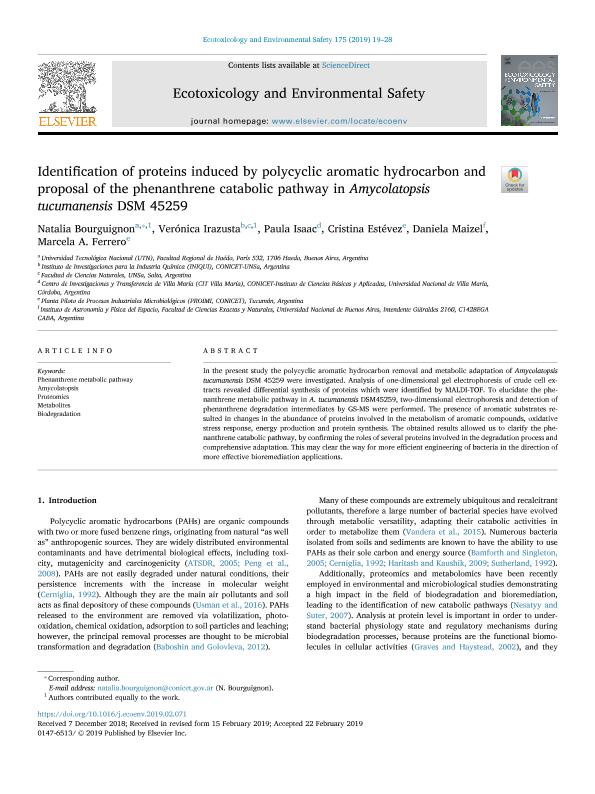Artículo
Identification of proteins induced by polycyclic aromatic hydrocarbon and proposal of the phenanthrene catabolic pathway in Amycolatopsis tucumanensis DSM 45259
Bourguignon, Natalia ; Irazusta, Verónica Patricia
; Irazusta, Verónica Patricia ; Isaac, Paula
; Isaac, Paula ; Estévez, Maria Cristina
; Estévez, Maria Cristina ; Maizel, Daniela
; Maizel, Daniela ; Ferrero, Marcela Andrea
; Ferrero, Marcela Andrea
 ; Irazusta, Verónica Patricia
; Irazusta, Verónica Patricia ; Isaac, Paula
; Isaac, Paula ; Estévez, Maria Cristina
; Estévez, Maria Cristina ; Maizel, Daniela
; Maizel, Daniela ; Ferrero, Marcela Andrea
; Ferrero, Marcela Andrea
Fecha de publicación:
02/2019
Editorial:
Academic Press Inc Elsevier Science
Revista:
Ecotoxicology and Environmental Safety
ISSN:
0147-6513
Idioma:
Inglés
Tipo de recurso:
Artículo publicado
Clasificación temática:
Resumen
In the present study the polycyclic aromatic hydrocarbon removal and metabolic adaptation of Amycolatopsis tucumanensis DSM 45259 were investigated. Analysis of one-dimensional gel electrophoresis of crude cell extracts revealed differential synthesis of proteins which were identified by MALDI-TOF. To elucidate the phenanthrene metabolic pathway in A. tucumanensis DSM45259, two-dimensional electrophoresis and detection of phenanthrene degradation intermediates by GS-MS were performed. The presence of aromatic substrates resulted in changes in the abundance of proteins involved in the metabolism of aromatic compounds, oxidative stress response, energy production and protein synthesis. The obtained results allowed us to clarify the phenanthrene catabolic pathway, by confirming the roles of several proteins involved in the degradation process and comprehensive adaptation. This may clear the way for more efficient engineering of bacteria in the direction of more effective bioremediation applications.
Archivos asociados
Licencia
Identificadores
Colecciones
Articulos(INIQUI)
Articulos de INST.DE INVEST.PARA LA INDUSTRIA QUIMICA (I)
Articulos de INST.DE INVEST.PARA LA INDUSTRIA QUIMICA (I)
Citación
Bourguignon, Natalia; Irazusta, Verónica Patricia; Isaac, Paula; Estévez, Maria Cristina; Maizel, Daniela; et al.; Identification of proteins induced by polycyclic aromatic hydrocarbon and proposal of the phenanthrene catabolic pathway in Amycolatopsis tucumanensis DSM 45259; Academic Press Inc Elsevier Science; Ecotoxicology and Environmental Safety; 175; 2-2019; 19-28
Compartir
Altmétricas



